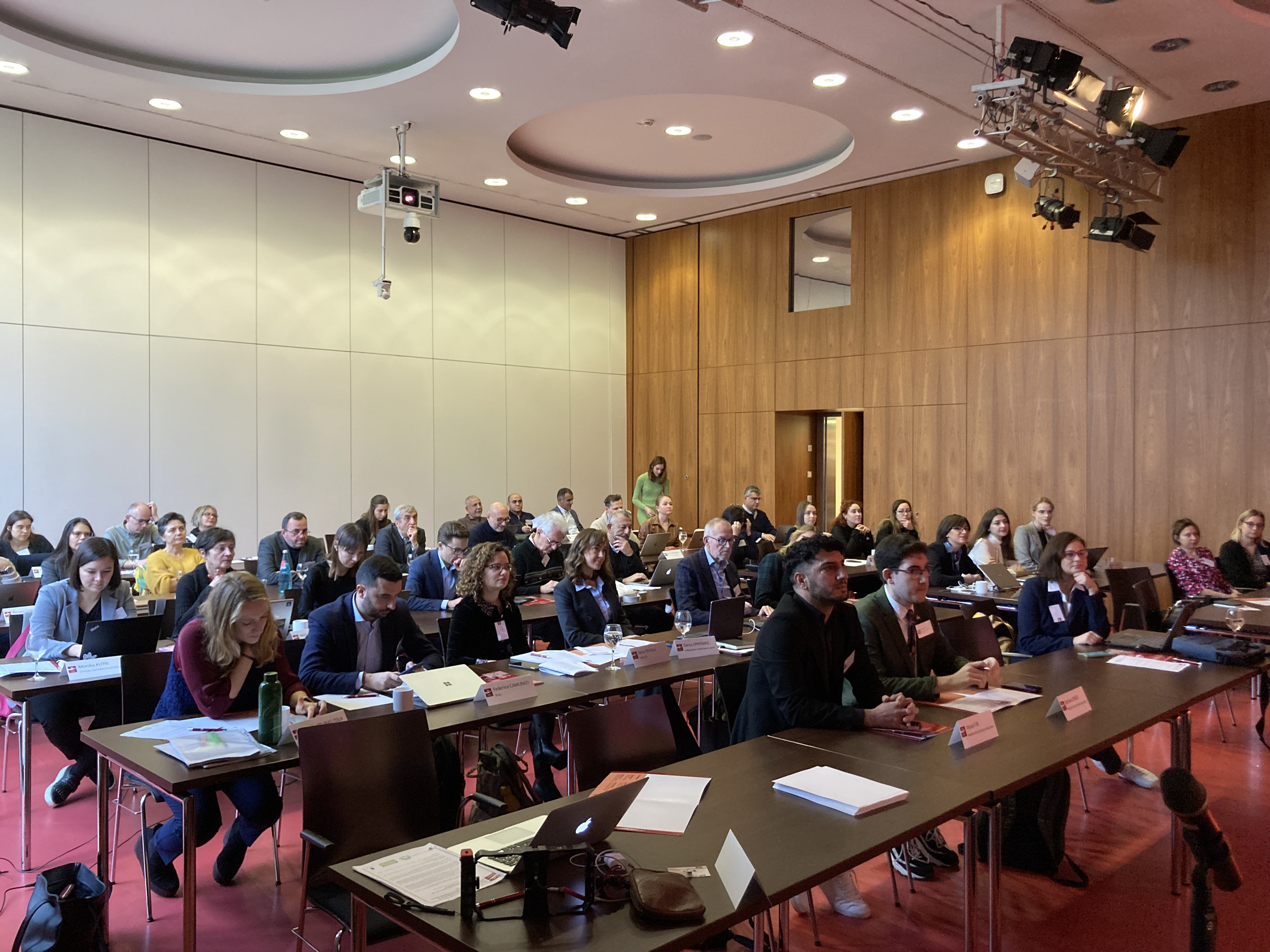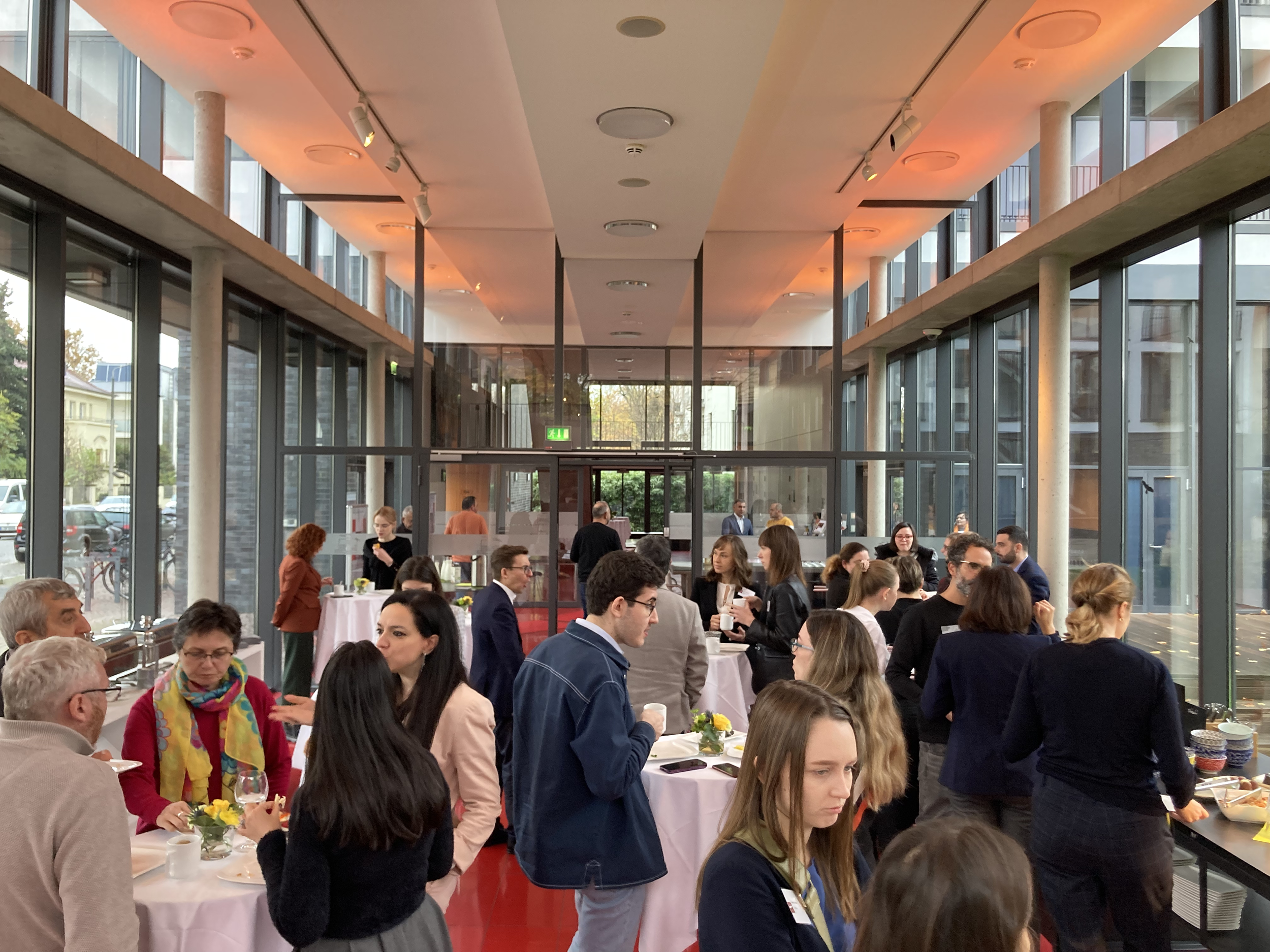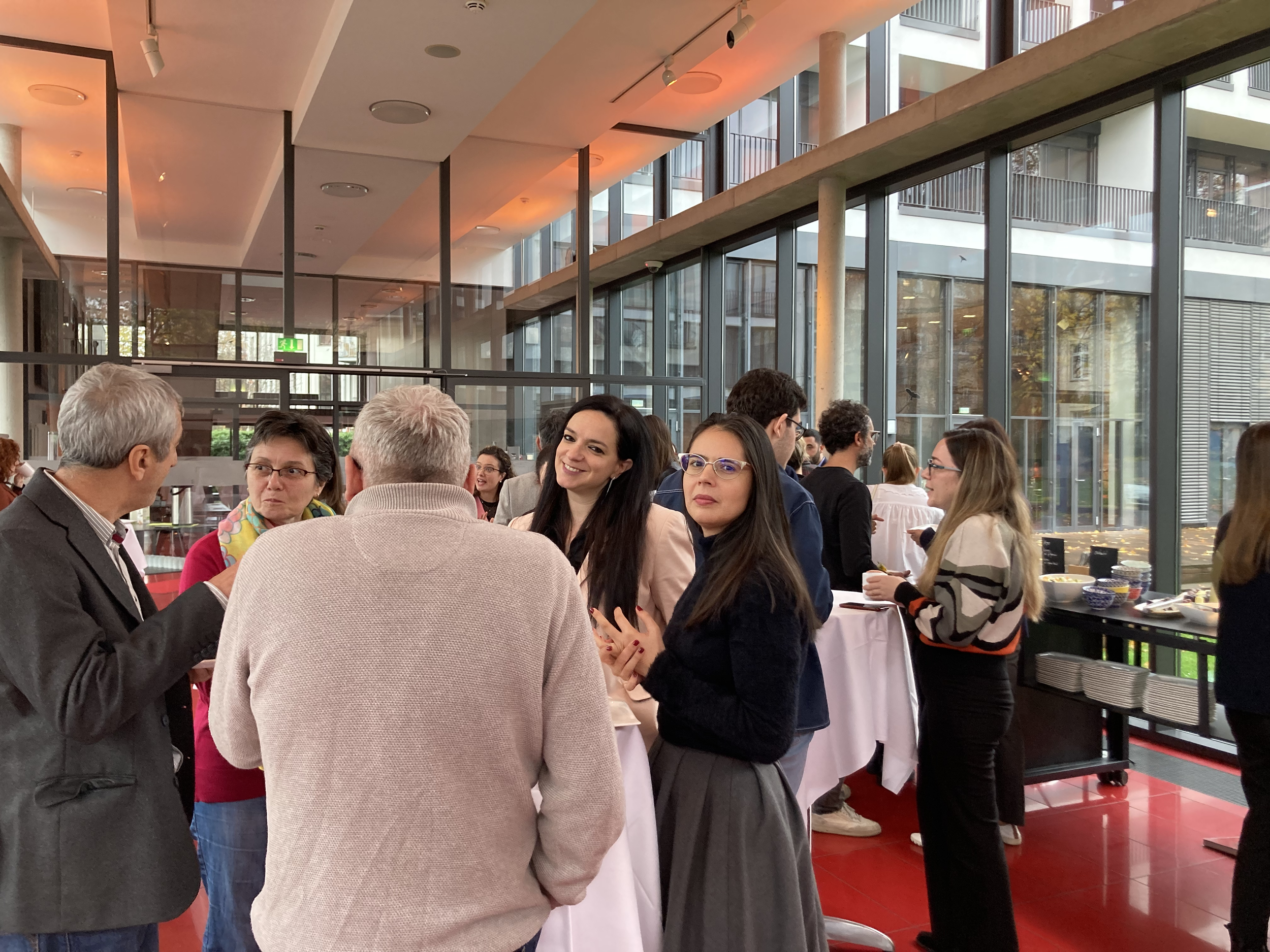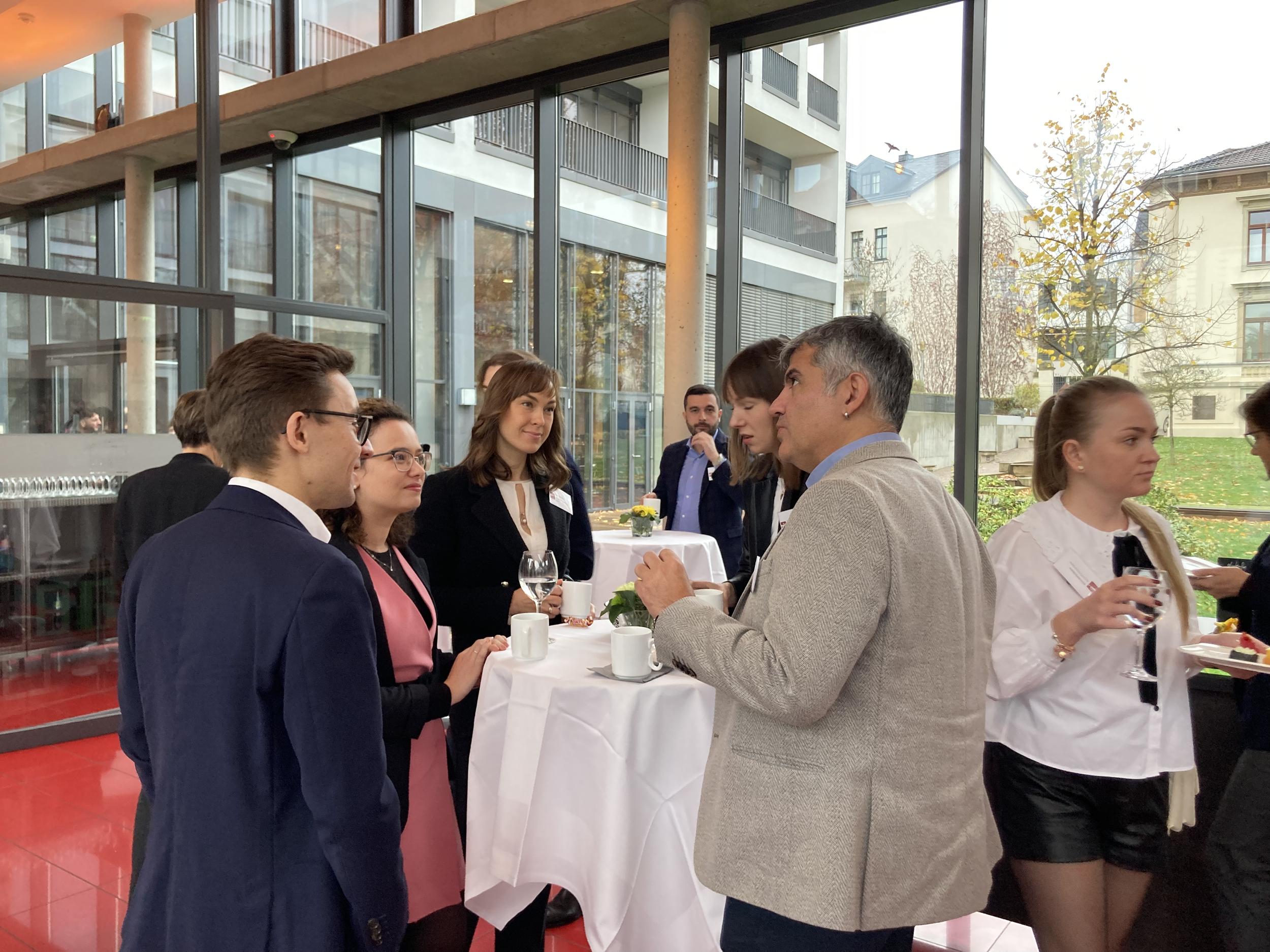On November 20th and 21st, the European Implementation Network organised a capacity-building conference in Leipzig, Germany. The conference, which brought together about 50 experts from 26 European civil society organisations, academics, and journalists, aimed at empowering civil society and its allies across Europe to promote free speech reforms through the implementation of ECtHR judgments. It addressed the complexities surrounding the implementation of ECtHR judgments related to freedom of expression in Europe, shedding light on the challenges faced by civil society in ensuring the execution of relevant judgments, and shared best practices for free speech advocacy.
Setting the Stage
The conference opened with a speech delivered by EIN Chair Prof. Dr. Başak Çalı, who placed emphasis on the importance of addressing the high number of pending freedom of expression leading judgments - approximately 100 - and the pivotal role of civil society in advocating for their execution to safeguard free speech in Europe.
The first session provided an introduction into the ECtHR implementation process and how NGOs can use it to advance freedom of expression in Europe. EIN Director Ioulietta Bisiouli discussed the general principles of the ECtHR implementation process and the impact of unimplemented free speech-related judgments on the democratic functioning and the upholding of the rule of law in European countries. The EIN Director underlined the primordial importance of upholding the Convention system through ensuring unwavering respect for its implementation mechanism, including in relation to free speech judgments, and recalled the human rights role of the Committee of Ministers, as well as the Deputies’ duty to hold recalcitrant States to account for their failures to achieve a timely and effective implementation of the ECtHR judgments.
The session continued with a presentation by EIN Finance and Programme Manager Agnès Ciccarone, who provided insights into how NGOs can enhance their impact on ECtHR implementation through effective Rule 9 submissions, outlining “The Dos and Don’ts for Rule 9 submissions in the implementation process”. Research on best practices for free speech advocacy was presented by EIN Law and Advocacy Officer Ioana Iliescu, emphasising on the need for constructive engagement with the national authorities, coalition-building, and effective communication about (non-)implementation of judgments, notably by working with the media.
The discussions in substance
The second session of the conference featured four panel discussions as well as two keynote speeches on a number of selected free speech-related topics that are addressed by the ECtHR case-law in a recurrent manner.
Civil and criminal defamation
Panel 1 : Georgiana Gheorghe, Andreas Takis, Dr. Başak Çalı, Tina Đaković, Nora Wehofsits (from left to right).
The first panel discussion was carried out with the participation of Georgiana Gheorghe, Executive Director at APADOR-CH, Tina Đaković, Organization and Program Coordinator at Human Rights House Zagreb, Nora Wehofsits, International Advocacy Officer at Human Rights House Foundation, and Andreas Takis, President of the Board of the Hellenic League for Human Rights.
The panel addressed the issue of defamation and the distinction between statements of fact and value judgments. Panellists highlighted the challenges faced in various European countries, such as the long-standing failure of national courts to apply relevant Art. 10 standards, in a continued pattern of non-compliance with multiple violation-finding judgments rendered by the ECtHR in the course of more than 1.5 decades (Greece), the thorny path to decriminalisation of defamation and the difficulties in consolidating the progress achieved (Romania), the disproportionate amount of damages awarded in defamation lawsuits, the need for stronger legislation and the provision of concrete criteria regarding the proportionality test between personality and free speech-related rights. The broader discussion highlighted the significance of anti-SLAPP advocacy and the role played by other mechanisms, such as the Council of Europe Commissioner for Human Rights, in triggering a political discussion capable of addressing this growing phenomenon in Europe. Overall, the panel underlined the need for a balanced legal approach to uphold freedom of expression while safeguarding individual personality rights.
Censorship and state control over the media
Ioulietta Bisiouli & Cristina Frumosu-Durnea.
Following this panel, Cristina Frumosu-Durnea, Program Manager at Independent Journalism Centre in Moldova, held a keynote speech focusing on the implementation of the Manole and Others case, which concerns censorship and state control over media bodies. The speaker shed light on censorship challenges and State control faced by the media, placing emphasis on the importance of research, active engagement and the strategic choice of timing when engaging with the implementation process to achieve an effective case supervision by the Committee of Ministers.
Protection of journalistic sources and access to public information
Panel 2: Nóra Novoszádek, Dr. Dariia Opryshko, Ioulietta Bisiouli, Ilaria Fevola, Dr. Dirk Voorhoof, Wiebke Hangst (from left to right).
The second panel consisted of Dr. Dariia Opryshko, Senior Fellow at the Institute for Information, Telecommunications and Media Law of the University of Münster and consultant of the NGO “Human Rights Platform”, Wiebke Hangst, Legal Officer at Media Defence, Ilaria Fevola, Legal officer at Article 19, Nóra Novoszádek, Senior Legal Officer at the Hungarian Helsinki Committee, as well as, Dr. Dirk Voorhoof, Professor emeritus on Freedom of Expression. The panel delved into the protection of journalistic sources and access to public information.
The importance of civil society engagement was underscored in the context of Ukraine, highlighting the need for both national and international involvement to stimulate political will and foster positive developments. The particular importance of upholding freedom of expression in the context of the work of human rights defenders was also underlined, including in relation to Hungary, along with the need for advocacy to elevate national issues to higher platforms, such as the EU, compelling respondent States to engage in the implementation process.
Panellists also brought into focus the impact of recourse to novel spyware on the protection of journalistic sources, emphasising on the existence of a worrisome correlation between high levels of unimplemented freedom of expression judgments and enhanced recourse to the use of such spyware by the same member States. Furthermore, the speakers looked into the forging of strategies for creating awareness and advocating for freedom of expression; the value of involving legal experts and academia in the implementation process, which led to full implementation of judgments concerning the protection of journalistic sources in Luxembourg, Belgium and the Netherlands; and the need to approach judgments as advocacy opportunities even before they are delivered, by making relevant third party interventions before the Court. An important conclusion of this panel was that significant delays in the implementation process can also occur as a result of the complacency of member States which otherwise adhere more strictly to democratic principles and generally uphold the rule of law. Vigilance as to the effectiveness of the implementation mechanism is therefore always required.
Freedom of expression of magistrates
Panel 3: Konrad Siemaszko, Georgiana Gheorghe, Kerem Altiparmak, Adela Katchaounova, Erika Farkas (from left to right).
The second day of the conference kicked off with a third panel discussion with the participation of Adela Katchaounova, Legal Defense Programme Director at the Bulgarian Helsinki Committee, Georgiana Gheorghe, Executive Director at APADOR-CH, Konrad Siemaszko, Lawyer and Head of the Freedom of Expression Programme at the Helsinki Foundation for Human Rights, as well as Erika Farkas, Legal Officer at the Hungarian Helsinki Committee.
The panel addressed the issues surrounding the freedom of expression of magistrates. Panellists discussed the chilling effect of political attacks and disciplinary measures on magistrates, as well as advocacy strategies based on experiences from different European countries, including Bulgaria, Hungary, Poland and Romania. Panellists addressed how positive developments in this field are often dependent on the windows of opportunity created by changes in the political context. They also discussed the fact that the ‘chilling effect’ of restrictions to the freedom of expression of magistrates is rather part of broader political strategies aiming at weakening judicial independence. Successfully advocating for freedom of expression in this context therefore requires a multifaceted approach, which includes recognising broader patterns, cultivating alliances, integrating individual narratives, leveraging media attention at every stage of implementation, as well as grounding advocacy strategies in foundational principles and resources.
Safety and security of journalists and other media actors
Panel 4: Vafa Fati-Zada (on screen), Dr. Dariia Opryshko, Szabolcs Hegyi, Ilaria Fevola, Veysel Ok (from left to right).
The fourth panel discussion featured Dr. Dariia Opryshko, Senior Fellow at the Institute for Information, Telecommunications and Media Law of the University of Münster and consultant of the NGO “Human Rights Platform”, Vafa Fati-Zada at the Justice for Journalists Foundation, Veysel Ok, Attorney at Law and Co-Director of the Media Law and Studies Association (MLSA), as well as Ilaria Fevola, Legal officer at Article 19.
The panel focused on the safety and security of journalists and other media actors, who are fundamental pillars of a free and vibrant democracy. Journalists often face important risks such as censorship, intimidation and violence which can even result in serious bodily harm and the loss of life, in their pursuit of truth and unhindered dissemination of public information. Panellists discussed the positive developments in strengthening the legal framework for the protection and safety of journalists which were recorded in Ukraine after 2014, while underlining the challenges in ensuring effective investigations into attacks against journalists that remain unaddressed. Other good practices which have ensured the safety, well-being, and release from prison of journalists working in difficult contexts and jurisdictions have also been contributed. The speakers furthermore addressed the important, ongoing challenges faced by journalists and the media in Turkey, whereas the worrisome correlation between the increasing use of strategic lawsuits against public participation (SLAPPs) and risks in the safety and security of journalists most often targeted by SLAPPs was also explored.
Monitoring freedom of expression judgments in the specific context of the Russian Federation
Violetta Fitsner.
The session was closed by a keynote speech by OVD-Info Advocacy Lawyer, Violetta Fitsner, who gave a sobering account of the challenges in implementing (inter alia) freedom of expression judgments in Russia,[1] emphasising on the need for continued civil society engagement with the implementation process and the necessity to continue raising implementation concerns with alternative international human rights mechanisms, but also underscoring the resilience, determination and commitment of Russian human rights defenders to bringing ECtHR judgments to fruition.
Putting implementation skills into practice
The third session of the 2-day conference consisted in break-out practical exercises, allowing participants to apply the knowledge and skills garnered throughout the capacity-building event. Participants worked in groups to brainstorm on the strategy and the content of mock Rule 9 submissions in ECtHR free speech-related judgements.
Empowering Voices: Charting the Future of Freedom of Expression Implementation in Europe
In her concluding remarks, EIN Director Ioulietta Bisiouli highlighted the primordial importance of participation to the implementation process, including in connection with free speech-related judgments. While recognising the crucial role political will plays for the timely and effective implementation of ECtHR judgments, she underlined the significance of knowledge about and active engagement of civil society with the implementation process with a view to addressing existing gaps and unlocking the full potential of the Convention system and its implementation mechanism in cases where such political will is weak or inexistent. She concluded by emphasising on the importance of individual responsibility for upholding the Convention system and on the need to read the Reykjavík principles as an invitation to renew the European societies’ bond therewith and to acknowledge the importance of the Convention system as a unique mechanism, capable of bringing about tangible progress and improvement in the level of enjoyment of human rights of European citizens, under the condition that the inherent weaknesses of the implementation mechanism be acknowledged and effectively countered.
The EIN Leipzig capacity-building conference was not just a gathering of like-minded people. It was a meeting that allowed an in-depth exploration of challenges and opportunities for addressing them in the context of implementation of ECtHR freedom of expression and media freedom-related judgments. Participants left Leipzig armed with a global overview of the state of play in this field, as well as with concrete tools and best practices on advocating for the effective execution of free speech judgments, with the ultimate aim of putting them to good use and thus making a lasting positive impact on the upholding of the rule of law in Europe. The conference, which only kicked off in substance the relevant EIN project foreseen to be concluded in the first part of 2025, thus marked a significant step forward towards a more robust, informed, and engaged civil society in the pursuit of a Europe where freedom of expression is not just acknowledged in judgments but also turns into a tangible, concrete, effectively protected and respected right.
We extend our sincere gratitude to the Swedish Postcode Lottery, the Fritt Ord Foundation and the Isocrates Foundation for their generous funding, which enables us to undertake this important project, as well as to the Mediencampus Villa Ida in Leipzig for providing an ideal venue for our capacity-building conference and for effectively and gracefully assisting us in organising all the related logistics. Above all, we sincerely thank all the speakers, moderators and participants for making the Leipzig capacity-building event a true success. We will continue engaging with you bilaterally with a view to increasing the number of submissions and the overall effective engagement with the implementation mechanism in respect of ECtHR free speech-related judgments.
[1] Russia ceased to be a party to the Convention on September 16, 2022, but considers itself not a party from March 16, 2022 (date when Russia ceased to be a Member of the CoE). The authorities promulgated laws prohibiting implementation of the judgments of the ECtHR adopted after March 15, 2022, and stopped any communications with the Court and the Committee of Ministers.
















